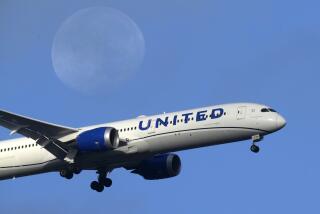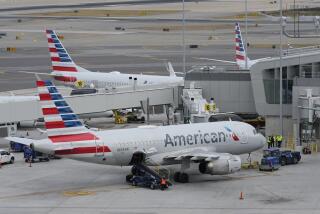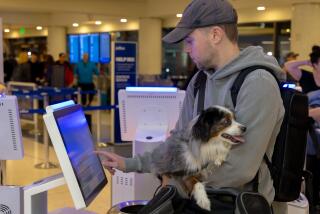Going the distance to get airlines awards
You keep hearing about people who take these fabulous trips (see story) and they don’t pay a penny — or very many pennies. You have miles, but you don’t seem to be getting much, well, mileage out of them.
For the last seven years, my life has been all about points. I quit my recruiting job on Wall Street, for which I traveled more than 150,000 miles a year (and collected numerous corporate credit card points), and founded ThePointsGuy.com, a website that’s all about maximizing frequent-flier miles and credit card points.
These days I have millions of miles that I accrue on the cheap. They allow me to travel the world in first-class style on a coach-seat budget.
Here are a few things that every traveler — not just frequent fliers — can do to be smarter about their miles and get more out of them.
Lots of people have frequent-flier miles — it’s estimated that more than 20 trillion miles and points are floating around out there — but few leverage them for their maximum value. You hear a lot about “good redemption” — that is, getting the most for your miles — but that really depends on what you want to use the miles for and where you want to go.
In monetary terms, you calculate the value of a mile by dividing the price of a ticket over the number of miles you would have to redeem for the same itinerary. For instance, let’s say a round-trip domestic ticket in economy costs $300, or 25,000 miles. If you redeemed your miles, you’d be getting a value of 1.2 cents per mile. Pretty standard.
The beauty of redeeming miles is that often first-class award tickets might only require 40% more miles than coach, but the price of that ticket could be 500% the price of coach. Redeeming miles for expensive tickets is where you get the most value.
Still, it’s not just about first-class awards. You can get great values on economy redemptions such as off-peak awards. But first to the nuts and bolts.
Distance and dollars
There are two main types of airline mileage programs. The traditional distance-based programs, such as those of American, Delta and United, generally award you one frequent-flier mile for each mile flown and let you redeem miles in continental-based zones such as North America or Europe.
Revenue-based programs — think Southwest and JetBlue — award fliers points based on how much money is spent on fares.
Distance-based programs can be frustrating because award seats can be scarce. On the up side, those “distance miles” can also be leveraged much more lucratively than “revenue miles” programs.
Here’s why: Let’s say American has off-peak awards that require 40,000 miles for a round-trip economy fare from North America to Europe. Whether you are flying from Boston to Dublin or San Diego to Istanbul, the number of miles required is the same. If you know the “sweet spots” in your program’s mileage redemptions, you can get expensive flights for relatively few miles. For example, you would need only 110,000 US Airways miles to fly round trip in business class to Australia, and you can stop over in Asia if you like.
By contrast, programs such as Southwest Rapid Rewards and JetBlue TrueBlue points cap the amount of value you can get out of your points. What you lose in ability to get expensive tickets for less, you gain in consistency and seat availability. For instance, you know you will always get around 1.8 cents per point when you redeem for Southwest Wanna Get Away fares. (That value drops when you purchase more flexible and premium fares, such as business select, which require more points.)
If you mostly redeem for economy fares and can travel only during peak periods, you may come out ahead with revenue-based programs because they generally do not have blackout dates.
As always, you have to do the math and see whether redemption makes sense value-wise for you.
To your credit
You can accumulate miles by flying, of course. But unless you, as a leisure traveler, are in constant motion, the miles game can seem elusive. It’s not.
Credit cards are among the easiest ways to accumulate miles. You can get as much as 100,000 miles on some cards by spending a certain amount of money (and I sometimes think the resulting awards should be called frequent-spender miles). In some cases, the award may be worth more than the annual credit card fee.
Several airline credit cards also allow their cardholders to redeem fewer miles for certain awards. Citi’s consumer American Airlines AAdvantage cards give members a 10% refund of their redeemed AAdvantage miles, up to 10,000 miles each year. US Airways offers award tickets with a 5,000-mile discount to its co-branded MasterCard cardholders.
Besides the perks, most airline credit cards come with lucrative sign-up bonuses. There’s really no limit to the amount of bonuses you can get, but you do need to understand the effect that multiple cards can have on your credit. As long as you pay your bills off on time, you should be able to apply for the bonuses you want.
Just make sure the annual fees of your cards do not negate the value of the perks you receive as a cardholder. You can also cancel a card to avoid the annual fee or downgrade to a card with no annual fee from the same bank to maintain your credit line.
Once you get the miles, one of your most important allies in getting the most from them is airline alliances. Most airlines are members of the three global alliances: Oneworld (American, British Airways, Cathay Pacific, Qantas and others), Skyteam (Delta, Air France/KLM, Korean Air and others) and the Star Alliance (United, Lufthansa, Singapore and others).
That means you can earn miles that go into your primary frequent-flier account when you fly on that airline’s partners. For instance, when flying Air France, you can earn Delta miles because the two are part of the same alliance.
The same is true of redeeming miles. You should be able to use your frequent-flier miles for award tickets on an alliance carrier. Thus, you don’t need to redeem United miles just for United flights, but you can redeem them on Lufthansa or Singapore, among others.
Get the awards
Airlines don’t always make it easy to use your miles. Some airlines don’t even let you search for award seats on their partner airlines. Here’s the most important thing: Don’t give up.
Other people will give up, but you can use this to your advantage because it means there will actually be more unclaimed award seats for the picking.
More advanced frequent fliers use tools such as ExpertFlyer.com, which isn’t free, to search for open award seats on specific flights and also set alerts so that when award seats become available, they receive email notifications. You don’t constantly have to check for availability, and you will have the edge against other fliers looking for those same awards. It takes some practice to understand the ins and outs of it, but if you fly a lot, it can save you time and money to make it worth it.
Not surprisingly, airlines have gotten crafty at charging extra fees, including fees on award tickets. Many of these fees are waived for elite members, which is one reason that giving loyalty to one airline can ultimately pay off in more ways than just free upgrades.
Common fees include late or close-in booking fees; most airlines will charge around $75 for booking a ticket within three weeks of departure. The solution: Try to redeem with airlines (Delta and British Airways, among them) that don’t charge those.
Many airlines require you to book complicated or partner awards by phone but charge a $25 fee for doing so. The solution: Always request that the fee be waived because you could not book the ticket online. In many cases the airline will comply. It never hurts to ask.
Some airlines (US Airways and Delta, for instance) charge $150 to change an award ticket, but others (American and United) will let you make date changes free if you keep the departure and destination the same. Solution: If you think your plans might change, go with the fee-free.
The true measure of your miles’ value is whether they get you where you want to go. Do not let them expire, don’t let them go unused and do not assume they are worthless. My miles have allowed me to travel the world for pennies on the dollar. In the end, if you are happy with your redemption and your miles saved you money, you’ve received good value for them. And that’s all that really matters.
More to Read
Sign up for The Wild
We’ll help you find the best places to hike, bike and run, as well as the perfect silent spots for meditation and yoga.
You may occasionally receive promotional content from the Los Angeles Times.






